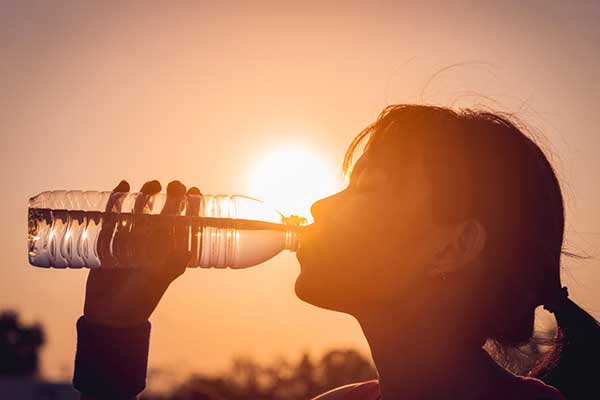What Arizonans consider normal heat would trigger excessive heat warnings in other states. Extreme heat warnings for Phoenix, Tucson, Yuma and other Arizona cities are based on a special computer model and are not necessarily based on the same criteria that other National Weather Service offices use. The computer model measures heat impact levels and the dangers they pose to people. The algorithm factors in both the forecast high and low. If the calculation produces a result that crosses the “extreme” threshold, a warning is issued.
But summer heat can caused serious health problems, even before an excessive heat warning is issued. According to the National Weather Service, the average summer temperature in the Phoenix area in July is 106 degrees. Over the next week, temperatures in the Gila Valley and surrounding areas is predicted to be 105 degrees and above. Extreme heat can be dangerous, even deadly, pushing the human body beyond its limits.
Most heat disorders strike when people spend too much time in the heat or overexert themselves. Older adults, young children and people who are sick, overweight or have an underlying health condition are more susceptible to heat-related illness.
Conditions that can induce heat-related illnesses include stagnant atmospheric conditions and poor air quality. Consequently, people living in urban areas may be at greater risk from the effects of a prolonged heat wave than those living in rural areas. Also, asphalt and concrete store heat longer and gradually release heat at night, which can produce higher nighttime temperatures known as the “urban heat island effect.”
In extreme heat, you should:
- Never leave children or pets alone in closed vehicles.
- Stay indoors as much as possible and limit exposure to the sun.
- Stay on the lowest floor out of the sunshine if air conditioning is not available.
- Drink plenty of water; even if you do not feel thirsty. Avoid drinks with caffeine. Persons who have epilepsy or heart, kidney, or liver disease; are on fluid-restricted diets; or have a problem with fluid retention should consult a doctor before increasing liquid intake.
- Limit intake of alcoholic beverages.
- Dress in loose-fitting, lightweight, and light-colored clothes that cover as much skin as possible. Avoid dark colors because they absorb the sun’s rays.
- Protect face and head by wearing a wide-brimmed hat.
- Avoid strenuous work during the warmest part of the day. Use a buddy system when working in extreme heat, and take frequent breaks.
- Avoid extreme temperature changes.
- Check on your animals frequently to ensure that they are not suffering from the heat. Go to a designated public shelter if your home loses power during periods of extreme heat.
Be Prepared
- Build an emergency kit and make a family communications plan.
- Spend the warmest part of the day inside at home or a public building (e.g., libraries, schools, movie theaters, shopping malls, and other community facilities). Circulating air can cool the body by increasing the perspiration rate of evaporation.
- Postpone outdoor games and activities.
- Check on family, friends, and neighbors who are at higher risk for heat-related illness, do not have air conditioning and/or spend much of their time alone.
- Eat well-balanced, light and regular meals. Avoid using salt tablets unless directed to do so by a physician.
To prepare for extreme heat, you should:
- Check air-conditioning ducts for proper insulation.
- Weather-strip doors and sills to keep cool air in.
- Cover windows that receive morning or afternoon sun with drapes, shades, awnings, or louvers. (Outdoor awnings or louvers can reduce the heat that enters a home by up to 80 percent.)
- Listen to local weather forecasts and stay aware of upcoming temperature changes.
- Be aware that people living in urban areas may be at greater risk from the effects of a prolonged heat wave than are people living in rural areas.
- Get trained in first aid to learn how to treat heat-related emergencies.
Don’t wait for an excessive heat warning, prepare now and be safe this summer.
(Source: https://www.ready.gov/heat)









